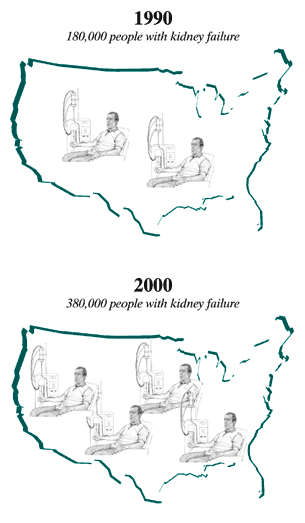

Chronic Kidney Disease: A Family Affair
On this page:
Chronic kidney disease (CKD) is the permanent loss of kidney function. CKD may be the result of physical injury or a disease that damages the kidneys, such as diabetes or high blood pressure. When the kidneys are damaged, they do not remove wastes and extra water from the blood as well as they should.
CKD is a family affair because you may be at risk if you have a blood relative with kidney failure.
CKD is a silent condition. In the early stages, you will not notice any symptoms. CKD often develops so slowly that many people don't realize they're sick until the disease is advanced and they are rushed to the hospital for life-saving dialysis.
A Growing Problem
CKD is a growing problem in the United States. Between 1990 and 2000, the number of people with kidney failure requiring dialysis or transplantation virtually doubled to 380,000. If this trend continues, the number of people with kidney failure will approach 700,000 by 2010. The annual cost of treating kidney failure in the United States has already topped $20 billion.
Kidney failure is only a part of the picture. Experts estimate that 20 million Americans have significantly reduced kidney function, and even a small loss of kidney function can double a person's risk of developing cardiovascular disease. Many of these people will experience heart attacks or strokes before they become aware of their kidney disease. So identifying and treating CKD early can help prevent heart problems as well as postpone kidney failure.

Between 1990 and 2000, the number of people with kidney failure requiring dialysis or transplantation more than doubled.
[Top]
Who is at risk?
Risk factors are conditions that make you more likely to develop a disease. The leading risk factors for CKD are
- diabetes
- high blood pressure
- family history of kidney failure
Having diabetes increases your risk of developing CKD. In fact, diabetes is the leading cause of kidney failure. High blood pressure is the second leading cause.
CKD runs in families, so you may have an increased risk if your mother, father, sister, or brother has kidney failure.
Some racial groups are also at increased risk for CKD.
- African Americans are nearly four times as likely to develop kidney failure as white Americans.
- American Indians have nearly three times the risk compared to whites.
- Hispanic Americans have nearly twice the risk of non-Hispanic whites.

Screening for kidney disease includes simple blood and urine tests.
If you have diabetes or high blood pressure, or a close family member with kidney failure, you should get checked for kidney disease, especially if you're a member of one of the racial or ethnic groups at higher risk for CKD.
[Top]
How can I find out if I have CKD?
Since early CKD has no symptoms, the only way to find out if you have it is through simple medical tests.
- Blood pressure. High blood pressure can lead to kidney damage, and it can also be a sign that kidney damage has already occurred. If your blood pressure is high, you'll want to get it under control to make sure your kidneys remain healthy.
- Blood. The glomerular filtration rate (GFR) measures how efficiently the kidneys are filtering waste from the blood. The new method of calculating GFR requires only a measurement of the creatinine (kree-AT-ih-nin) in a blood sample. Creatinine is a waste product in the blood created by the normal breakdown of muscle cells during activity. When kidneys are not working well, creatinine builds up in the blood.
- Urine. Measuring the amount of a protein called albumin in the urine can show a kidney problem. A large amount of protein in the urine is known as proteinuria and is a sign of kidney damage. Your doctor may test for protein using a dipstick in a sample of your urine taken in the doctor's office. The color of the dipstick indicates the level of protein.
A test that can show smaller amounts of protein or albumin in the urine is called a microalbumin test and also uses a dipstick in the urine.
Your doctor may also do a calculation of the protein-to-creatinine or albumin-to-creatinine ratio. Healthy kidneys move creatinine from the blood into the urine. A ratio greater than 30 milligrams of albumin per 1 gram of creatinine indicates that the kidneys are leaking helpful substances from the blood and failing to filter out harmful substances. This test should be used in people at high risk, especially those with diabetes.
If your first laboratory test shows high levels of protein, another test should be done 1 to 2 weeks later. If the second test also shows high levels of protein, you have persistent protein in the urine (proteinuria) and should have additional tests to test your kidney function.
A 24-hour urine collection is no longer necessary. Small samples of urine and blood, which can easily be taken in the doctor's office, are all the new methods require.
Several organizations offer free screenings for kidney disease. You may be able to have your kidney function measured at a local health fair. The National Kidney Foundation's KEEP (Kidney Early Evaluation Program) initiative offers blood and urine testing, onsite consultation with a physician, and referral and followup services for people whose test results are outside the normal range. The American Kidney Fund's MIKE (Minority Intervention and Kidney Education) Program offers educational sessions and medical screenings. The American Association of Kidney Patients' Finding Your Strength program offers education about your kidneys, tests to expect, and ways to stay healthy with CKD. Contact information for these and other organizations appears in the For More Information section at the end of this fact sheet.
[Top]
What can I do to slow down or avoid kidney failure?
Learning about reduced kidney function allows you to take steps to keep your kidneys healthy as long as possible. You can control many of the things that can make CKD worse and may lead to kidney failure.
- If you have diabetes, control your blood glucose, also called blood sugar. Studies show that keeping tight control of blood glucose can delay or prevent kidney failure.
- If you have high blood pressure, keep your blood pressure below 140/90 mm Hg.
- If you have high blood pressure with CKD, keep your blood pressure below 130/80 mm Hg. Blood pressure medicines called ACE (angiotensin-converting enzyme) inhibitors and ARBs (angiotensin receptor blockers) protect the kidneys better than other medicines. You may need a combination of two or more drugs to keep your blood pressure below 130/80. In many cases, a medicine that lowers blood pressure by increasing urination, called a diuretic, should also be part of the plan.
- If you have CKD, don't eat too much protein. Protein breaks down into the waste products the kidneys must excrete. Reducing those waste products by eating less protein means the kidneys don't have to work so hard. But eating too little protein can lead to poor nutrition. Work with a dietitian to make sure you get the right amounts of protein and other nutrients.
[Top]
What can I do to avoid the complications of CKD?
CKD can lead to many other health problems well before kidney failure occurs.
- Anemia. Anemia develops when the kidneys fail to produce enough erythropoietin, or EPO, the hormone that directs the bones to make red blood cells. Anemia can cause heart problems.
- Bone problems. Healthy kidneys help keep your bones strong by balancing the levels of calcium and phosphorus in the blood. CKD can lead to bone problems by throwing those minerals out of balance.
- Acidosis. The kidneys also maintain the acid/base balance in the blood. Kidney problems may lead to acidosis, a condition in which the blood is too acidic. Acidosis can disrupt body functions.
- Cardiovascular disease (CVD). Patients with CKD are more likely to die from a heart attack or stroke than from kidney failure. Even a small loss of kidney function can double a person's risk of developing CVD.
If you have CKD, you will need to have regular checkups to monitor blood levels of creatinine, urea nitrogen, potassium, phosphorus, parathyroid hormone, hemoglobin, and cholesterol. If your blood tests show abnormal levels of any of these substances several times, your doctor will prescribe medicines. For example, if you have anemia indicated by low levels of hemoglobin on repeated tests, your doctor can prescribe a synthetic form of EPO (erythropoietin) to help your body make more red blood cells.

You have the power to prevent kidney failure.
Work with your doctor to manage the health problems that CKD can cause. Taking charge of your health can make your kidneys last longer. You have the power to prevent kidney failure.
[Top]
Points to Remember
- Chronic kidney disease (CKD) is a growing problem in the United States. Some 20 million Americans with reduced kidney function are at increased risk for kidney failure and cardiovascular disease.
- The leading causes of CKD are diabetes and high blood pressure. If you have either one of these conditions, you should have your kidney function checked regularly.
- CKD can run in families. If you have a parent, brother, or sister with kidney failure, you should have your kidney function checked.
- African Americans, American Indians, and Hispanic Americans have higher rates of CKD than white Americans. If you belong to one of these high-risk groups and have any of the other risk factors for CKD, you should have your kidney function checked.
- Medical tests for kidney function should include a check for protein in the urine and a calculation of glomerular filtration rate (GFR) based on a measurement of creatinine in the blood.
- If CKD is found early, you can manage it to prevent or delay kidney failure and avoid cardiovascular disease.
[Top]
Hope through Research
The National Institute of Diabetes and Digestive and Kidney Diseases (NIDDK) has many research programs aimed at slowing the progression of chronic kidney disease. The NIDDK is sponsoring the Chronic Renal Insufficiency Cohort (CRIC) Study to determine the risk factors for rapid decline in kidney function and development of cardiovascular disease. This study of about 3,000 patients with chronic renal insufficiency, which is another way of describing CKD, will reflect the racial, ethnic, and gender composition of the ESRD population in the United States. The data collected and specimens obtained from people in this study will serve as a national resource for investigating chronic kidney as well as cardiovascular disease. Establishing this group of patients and following them into the future will also provide an opportunity to examine genetic, environmental, behavioral, nutritional, quality-of-life, and health resource utilization factors in this population. The main part of the study will consist of monitoring patients and following up at regular clinic visits with kidney function measurements, cardiovascular studies, and laboratory tests. In addition, participants will answer questionnaires to assess various demographic, nutritional, and quality-of-life factors.
[Top]
For More Information
American Association of Kidney Patients
3505 East Frontage Road
Suite 315
Tampa, FL 33607
Phone: 1–800–749–2257 or 813–636–8100
Email: info@aakp.org
Internet: www.aakp.org
American Kidney Fund
6110 Executive Boulevard
Suite 1010
Rockville, MD 20852
Phone: 1–800–638–8299 or 301–881–3052
Email: helpline@kidneyfund.org
Internet: www.kidneyfund.org
Life Options Rehabilitation Resource Center
c/o Medical Education Institute, Inc.
414 D'Onofrio Drive
Suite 200
Madison, WI 53719
Phone: 1–800–468–7777
Email: lifeoptions@MEIresearch.org
Internet: www.lifeoptions.org
National Kidney Disease Education Program
3 Kidney Information Way
Bethesda, MD 20892
Phone: 1–866–4–KIDNEY (454–3639)
Email: nkdep@info.niddk.gov
Internet: www.nkdep.nih.gov
National Kidney Foundation
30 East 33rd Street
New York, NY 10016
Phone: 1–800–622–9010 or 212–889–2210
Email: info@kidney.org
Internet: www.kidney.org
[Top]
National Kidney and Urologic Diseases Information Clearinghouse
3 Information Way
Bethesda, MD 20892–3580
Phone: 1–800–891–5390
TTY: 1–866–569–1162
Fax: 703–738–4929
Email: nkudic@info.niddk.nih.gov
Internet: www.kidney.niddk.nih.gov
The National Kidney and Urologic Diseases Information Clearinghouse (NKUDIC) is a service of the National Institute of Diabetes and Digestive and Kidney Diseases (NIDDK). The NIDDK is part of the National Institutes of Health of the U.S. Department of Health and Human Services. Established in 1987, the Clearinghouse provides information about diseases of the kidneys and urologic system to people with kidney and urologic disorders and to their families, health care professionals, and the public. The NKUDIC answers inquiries, develops and distributes publications, and works closely with professional and patient organizations and Government agencies to coordinate resources about kidney and urologic diseases.
Publications produced by the Clearinghouse are carefully reviewed by both NIDDK scientists and outside experts.
This publication is not copyrighted. The Clearinghouse encourages users of this publication to duplicate and distribute as many copies as desired.
This publication was reviewed by Phylis Ermann, L.C.S.W., American Kidney Fund; and Kris Robinson, Executive Director, American Association of Kidney Patients.
NIH Publication No. 05–5391
March 2005
[Top]
|






